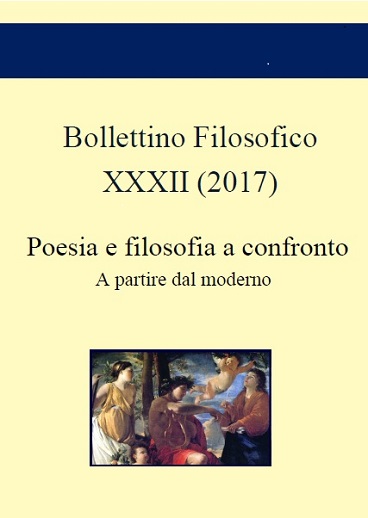Il Faust di Goethe come tragedia filosofica
Abstract
Many philosophers, both in Nineteenth Century and in Twentieth Century have discussed Goethe’s masterpiece Faust. But not all their interpretations are philosophical interpretations of the Drama. Christian Hermann Weiße and Friedrich Theodor Vischer, as well as Heinrich Rickert and Benedetto Croce red the Tragedy as a literary work. In reading the Poem they acted not qua philosophers, but qua literary critics. The present essay discusses a another type of reading of the Drama, i.e. the interpretations which regard the Text as a philosophical Work and not only as a literary product. Apparently, Hegel was the first who spoke of Goethe’s Faust in terms of die absolute philosophische Tragődie, the absolute philosophical Tragedy. Indeed, it was probably Hegel’s student, H. Hotho, who first used this definition. This circumstance did not prevent Ernst Bloch from regarding Faust as a literary transposition of Hegel’s dialectic. George Santayana, on the contrary, has regarded Goethe’s Drama as the illustration of the philosophy of Romanticism, while recently and quite surprisingly Gernot Bőhme has seen in the Drama an ironic confutation of the smoothed human pretense of annihilating Nature through Technique.Downloads
Bollettino Filosofico pubblica in internet, ad accesso aperto, con licenza:
|
|
CCPL Creative Commons Attribution |
L'autore conserva il copyright sul suo contributo, consentendo tuttavia a chiunque "di riprodurre, distribuire, comunicare al pubblico, esporre in pubblico, rappresentare, eseguire e recitare l'opera", purché siano correttamente citati l'autore e il titolo della rivista. L’autore, al momento della proposta di pubblicazione, è inoltre tenuto a dichiarare che il contenuto e l’organizzazione dell’opera è originale e non compromette in alcun modo i diritti di terzi, né gli obblighi connessi alla salvaguardia di diritti morali ed economici di altri autori o di altri aventi diritto, sia per testi, immagini, foto, tabelle, sia per altre parti di cui il contributo può essere composto. L’autore dichiara altresì di essere a conoscenza delle sanzioni previste dal codice penale e dalle leggi speciali per l’ipotesi di falsità in atti ed uso di atti falsi, e che pertanto Bollettino Filosofico è esente da qualsiasi responsabilità di qualsivoglia natura, civile, amministrativa o penale, e sarà dall'autore tenuta indenne da qualsiasi richiesta o rivendicazione da parte di terzi.
